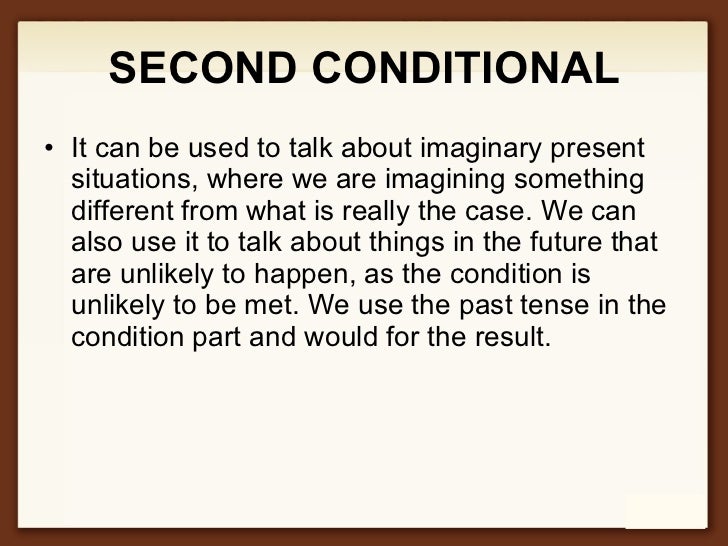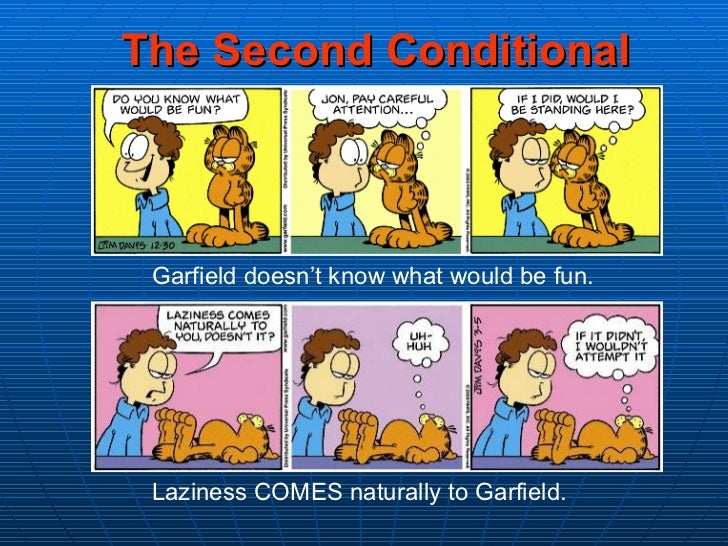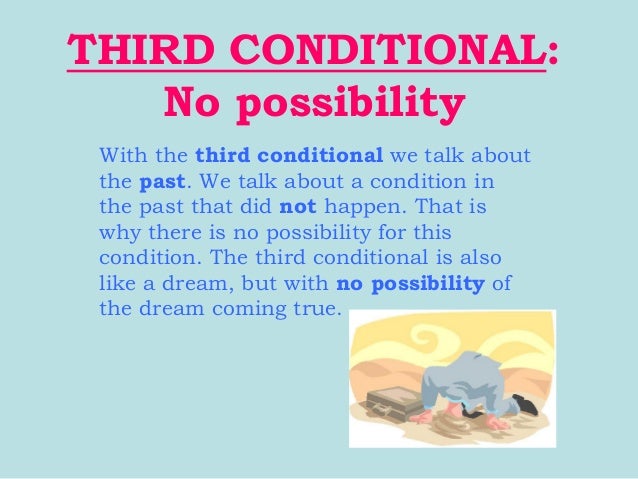UNIVERSIDAD NACIONAL DE CHIMBORAZO
Facultad de Ciencias de la Educación, Humanas y Tecnologías
Carrera de Ingles
SECOND CONDITIONAL

Here we have a commedi pinture that describe how the Second Conditional works as an imaginary.

The second conditional
is called the present
unreal conditional. It is
for hypothetical
activities.
To learn more about the
second conditional, try
the lesson and tests
below. - See more at: http://www.learnenglish-online.com/grammar/secondconditional.html#sthash.B6ryQjFq.dpuf
is called the present
unreal conditional. It is
for hypothetical
activities.
To learn more about the
second conditional, try
the lesson and tests
below. - See more at: http://www.learnenglish-online.com/grammar/secondconditional.html#sthash.B6ryQjFq.dpuf
The second
conditional is called the present unreal conditional. It is for hypothetical activities.
To learn more about the second conditional, try the lesson and tests below.
To learn more about the second conditional, try the lesson and tests below.
SECOND
CONDITIONAL STRUCTURE
If + Simple Past + Modal + Base Verb
Examples:
If + Simple Past + Modal + Base Verb
Examples:
- If I had more money, I would buy a car.
- If he were 16, he could drive.
USES
Unreal situations in the present
Unreal situations in the present
- If I were the teacher, I would make class shorter.
- If I were an animal, I would be a lion.
- If I were rich, I would buy a private jet.
- I would sleep more if I had time.
Impossible present situations
- I would go to the party, if I didn't have to work.
- If I could play piano, I would play for you.
Was vs. Were
Use “were” for all subjects.
Examples:
Use “were” for all subjects.
Examples:
- If I were rich, I would not work.
- If he were older, he would understand.
Second Conditional
Questions
Here are some examples second conditional questions:
Here are some examples second conditional questions:
- What would you do if you were me?
- If you had $1,000, what would you buy?
- If you could live anywhere in the
world, where would you
want to live? - Who would you like to meet, if you could meet anyone?
Notice that the questions are unreal situations. In the
examples, it is clear that it is impossible to live anywhere in the
world or meet anyone in the world.
examples, it is clear that it is impossible to live anywhere in the
world or meet anyone in the world.
The second conditional
is called the present
unreal conditional. It is
for hypothetical
activities.
To learn more about the
second conditional, try
the lesson and tests
below. - See more at: http://www.learnenglish-online.com/grammar/secondconditional.html#sthash.B6ryQjFq.dpuf
is called the present
unreal conditional. It is
for hypothetical
activities.
To learn more about the
second conditional, try
the lesson and tests
below. - See more at: http://www.learnenglish-online.com/grammar/secondconditional.html#sthash.B6ryQjFq.dpuf
The second conditional
is called the present
unreal conditional. It is
for hypothetical
activities.
To learn more about the
second conditional, try
the lesson and tests
below. - See more at: http://www.learnenglish-online.com/grammar/secondconditional.html#sthash.B6ryQjFq.dpuf
is called the present
unreal conditional. It is
for hypothetical
activities.
To learn more about the
second conditional, try
the lesson and tests
below. - See more at: http://www.learnenglish-online.com/grammar/secondconditional.html#sthash.B6ryQjFq.dpuf
The second conditional
is called the present
unreal conditional. It is
for hypothetical
activities.
To learn more about the
second conditional, try
the lesson and tests
below.
is called the present
unreal conditional. It is
for hypothetical
activities.
To learn more about the
second conditional, try
the lesson and tests
below.
SECOND CONDITIONAL STRUCTUREIf + Simple Past + Modal + Base Verb
Examples:
USESUnreal situations in the present
Imagined events
Impossible present situations
Was vs. WereUse “were” for all subjects.
Examples:
Second Conditional QuestionsHere are some examples second conditional questions:
Notice that the questions are unreal situations. In the
examples, it is clear that it is impossible to live anywhere in the
world or meet anyone in the world.
- See more at: http://www.learnenglish-online.com/grammar/secondconditional.html#sthash.B6ryQjFq.dpufExamples:
- If I had more money, I would buy a car.
- If he were 16, he could drive.
USESUnreal situations in the present
- If I were the teacher, I would make class shorter.
- If I were an animal, I would be a lion.
Imagined events
- If I were rich, I would buy a private jet.
- I would sleep more if I had time.
Impossible present situations
- I would go to the party, if I didn't have to work.
- If I could play piano, I would play for you.
Was vs. WereUse “were” for all subjects.
Examples:
- If I were rich, I would not work.
- If he were older, he would understand.
Second Conditional QuestionsHere are some examples second conditional questions:
- What would you do if you were me?
- If you had $1,000, what would you buy?
- If you could live anywhere in the world, where would you want to live?
- Who would you like to meet, if you could meet anyone?
Notice that the questions are unreal situations. In the
examples, it is clear that it is impossible to live anywhere in the
world or meet anyone in the world.
The second conditional
is called the present
unreal conditional. It is
for hypothetical
activities.
To learn more about the
second conditional, try
the lesson and tests
below. - See more at: http://www.learnenglish-online.com/grammar/secondconditional.html#sthash.B6ryQjFq.dpuf
is called the present
unreal conditional. It is
for hypothetical
activities.
To learn more about the
second conditional, try
the lesson and tests
below. - See more at: http://www.learnenglish-online.com/grammar/secondconditional.html#sthash.B6ryQjFq.dpuf
The second conditional
is called the present
unreal conditional. It is
for hypothetical
activities.
To learn more about the
second conditional, try
the lesson and tests
below.
is called the present
unreal conditional. It is
for hypothetical
activities.
To learn more about the
second conditional, try
the lesson and tests
below.
SECOND CONDITIONAL STRUCTUREIf + Simple Past + Modal + Base Verb
Examples:
USESUnreal situations in the present
Imagined events
Impossible present situations
Was vs. WereUse “were” for all subjects.
Examples:
Second Conditional QuestionsHere are some examples second conditional questions:
Notice that the questions are unreal situations. In the
examples, it is clear that it is impossible to live anywhere in the
world or meet anyone in the world.
- See more at: http://www.learnenglish-online.com/grammar/secondconditional.html#sthash.B6ryQjFq.dpufExamples:
- If I had more money, I would buy a car.
- If he were 16, he could drive.
USESUnreal situations in the present
- If I were the teacher, I would make class shorter.
- If I were an animal, I would be a lion.
Imagined events
- If I were rich, I would buy a private jet.
- I would sleep more if I had time.
Impossible present situations
- I would go to the party, if I didn't have to work.
- If I could play piano, I would play for you.
Was vs. WereUse “were” for all subjects.
Examples:
- If I were rich, I would not work.
- If he were older, he would understand.
Second Conditional QuestionsHere are some examples second conditional questions:
- What would you do if you were me?
- If you had $1,000, what would you buy?
- If you could live anywhere in the world, where would you want to live?
- Who would you like to meet, if you could meet anyone?
Notice that the questions are unreal situations. In the
examples, it is clear that it is impossible to live anywhere in the
world or meet anyone in the world.
.jpg)



